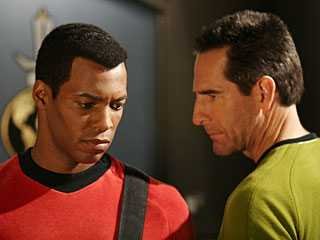This fourth season started strong. The three-episode arc looked like a solution to the problem of the decreased amount of time available to tell a story dramatically. Enterprise episodes are close to ten minutes shorter than TOS. Many of the first nine episodes were strong, the others were promising.
Coming back from the first break, there was a stumble (
Daedalus), then a triumph (
Observer Effect). The Andorian arc was solid, "
The Aenar" had moments of beauty. On balance, the Klingon arc worked: it made clever and meaningful connections both to the Arik Soong arc earlier in the season, and to the TOS-to-feature film Klingon forehead conundrum. Things were looking promising for what we knew, by the time the next set were in production, would be the last episodes.
But these last six exposed all of the weaknesses even in the better episodes: the loose ends and inexplicable events that could have been easily been tied up but weren't, the story threads that dangled, and especially the lack of character definition in the most important characters: T'Pol and especially Archer.
I could give you a character arc for each of them, much as the characters themselves did in their discussions with Riker the Chef in "Voyages." But within episodes, and from one episode to another, I couldn't tell you what motivated Archer, why he did what he did, what he thought: basically, who was he?
There were times I thought I was starting to understand T'Pol and her "journey" but it turns out, not really. By the end, I have no idea, except that she's still a scold with emotional problems. Blalock gave her an endearing vulnerabilty, but in the end this wasn't a satisfying character.
I could be wrong, but this was my experience. I don't blame the actors, either: they both had moments that displayed their skills, and they seemed fully committed to their roles. (Although there is a ring of rueful truth in
Zeke Hyman's description of Archer's range "from slightly pissed off to very pissed off.") I just don't think they were given what they needed---or maybe just what I needed, to feel that I know who these characters are. Or were.
Linda Park, Anthony Montgomery and Dominic Keating got the best out of the moments they were given, and as the kind of midpoint between minor and major characters, John Billingsley as Dr. Phlox was the solid anchor of the series, with never a false moment or bad performance, and adding colors and meaning when given the opportunity.
But for me the revelation was Connor Trinneer as the character I was all set to despise, the cracker buddy of the Cap'n, "Trip" Tucker. Written as a throwback to World War II movie clichés, Tucker was the first indication of questionable choices for this series. Yet Trinneer took this character through a discernable journey, and came out a more complex person, pretty close to an enlightened being. The lightness and sweetness he brought to Trip in that last scene with Riker was terrific. His tears over his infant daughter in
Terra Prime, though hardly prepared for in this rushed story, were effective and moving anyway. That's acting.
Trinneer was also generous in his scenes with other actors. There was no internal logic to the Trip-T'Pol relationship, though again, the actors seized what moments they were given by writers/producers/executives who couldn't make up their minds, or didn't care all that much about it.
Except for one unconvincing shot of the assembly on earth in "These are the voyages," visual effects maintained their high quality through these episodes, with the comet in "Terra Prime" and of course the final parade of Enterprises as the very last images of the series being especially memorable. I really admired and enjoyed the music in "Voyages" as well, with all the quotes of themes from past series, including Voyager and DS9.
Enterprise had the opportunity to really explore how earth got from the scarred remnants of World War III to the stars, and from there to the Federation. There were so many possibilities for thoughtful drama. But Enterprise wound up being neither very thoughtful nor very dramatic. These last episodes suggest that even given another few years, that potential likely would have remained unrealized.
So where does Star Trek go from here? Let's talk about that a little later.

